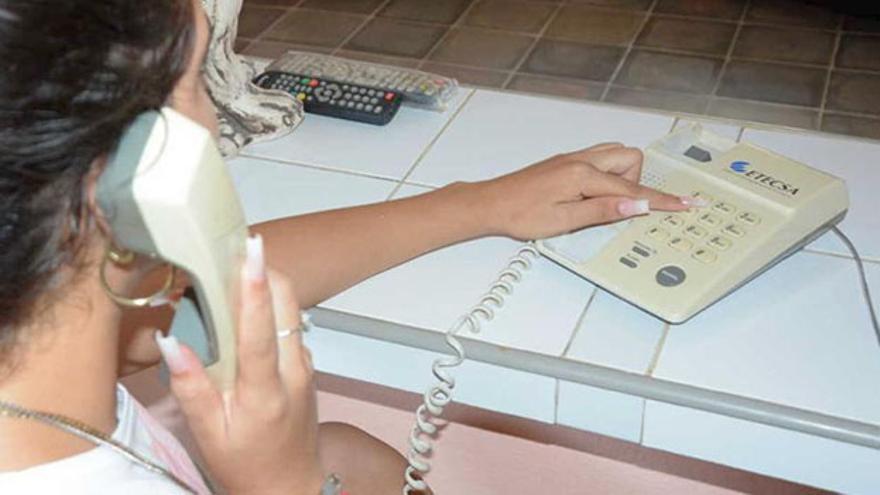
![]() 14ymedio, Havana, 2 August 2023 — The numbers of disconnected users of the Cuban Telecommunications Company (Etecsa) in the province of Sancti Spíritus are revealing both of the economic crisis that the island is going through, and the emigration that does not stop. Up to 200 customers have lost their landline, Escambray reported this Wednesday, due to delays in bill payments.
14ymedio, Havana, 2 August 2023 — The numbers of disconnected users of the Cuban Telecommunications Company (Etecsa) in the province of Sancti Spíritus are revealing both of the economic crisis that the island is going through, and the emigration that does not stop. Up to 200 customers have lost their landline, Escambray reported this Wednesday, due to delays in bill payments.
Miladys González, head of marketing for the state monopoly in the province, specified that 60% of these are concentrated in the municipalities of Sancti Spíritus and Cabaiguán. Most of the cases correspond to “closed houses,” continues the official, who has not alluded to the unstoppable exodus for almost two years.
In addition, the provincial newspaper reports, there are 150 customers at risk of losing service because they are more than three months late in paying the account, the majority reported in Sancti Spíritus, Trinidad and Jatibonico.
The data is disclosed two months after a resolution went into effect that obliges Etecsa to disconnect the telephone lines, with prior notice to the owner, after 30 days from the due date of the unpaid invoice.
The rule provides that the connection can be restored 24 hours after the user pays the total debt before 180 days have elapsed since the due date.
If those six months elapse without payment being made, González continued, Etecsa proceeds to cancel the service. In this case, the norm dictates that the client be notified with a minimum of 72 business hours at the registered address through a notice that is delivered “to the person who is in the place at that time,” regardless of whether he is the owner or a representative.
If the customer wants to maintain the service, Etecsa warns that the reconnection entails an additional “cost” that will be charged on the next bill.
González acknowledged that the company is also facing a shortage of paper and other supplies that makes it difficult for it to distribute printed invoices, for which reason he calls on customers to subscribe to receive the document by email, or alternately they must contact Etecsa through its 112 call center number or in the Transfermóvil application.
Although the number of mobile lines in Cuba is approaching eight million and far exceeds the little more than a million fixed lines, cell phones have not yet completely displaced the landline, which continues to be one of the main communication channels for many families, mainly in rural areas.
To this is added that in order to contract for the ’Nauta Hogar’ home internet connection service, which is provided through fiber optics, the customer must have a fixed telephone line. Without it, the customer has to make do with surfing the web through the mobile data service, with its congestion, speed oscillations and frequent hangups.
Also in the cities and towns there are small businesses that cannot afford the cost of a mobile line. This is the case of Antonio, an upholsterer in Nuevo Vedado, the commercial center of Havana, who makes all the agreements with clients through the cable line.
Every Cuban who has experienced it in recent years has an anecdote of how “hereditary” lines have been able to be sold to the highest bidder. This is how Lucía, a resident of Luyanó, in the Havana municipality of Diez de Octubre, remembers the relief she felt when she got rid of her landline phone. She was one of two residents in the area who had the device and, therefore, “the neighbors believed that she was obliged to serve them.” With the decriminalization of the dollar, she sold the connection for 600 dollars and with that money she sent out for repairs a refrigerator that had been damaged by constant blackouts.
“We went back to drinking cold water and we were able to store food, and I also bought some clothes for my children,” she recalls to 14ymedio. Another resident of Santiago de Cuba tells this newspaper that in 2014 he sold his fixed line for 400 dollars and with that money he paid for part of the trip to leave Cuba from the island.
Given the complex process to obtain authorization for a fixed connection, a home with this service has added value and an owner can ask for more money for the property if he wants to sell or rent it. In electronic commerce platforms, it is also common for Cubans to offer telephone lines, at prices ranging from 300 to 500 dollars, as can be seen on the Revolico digital buying and selling site.
____________
COLLABORATE WITH OUR WORK: The 14ymedio team is committed to practicing serious journalism that reflects Cuba’s reality in all its depth. Thank you for joining us on this long journey. We invite you to continue supporting us by becoming a member of 14ymedio now. Together we can continue transforming journalism in Cuba.
